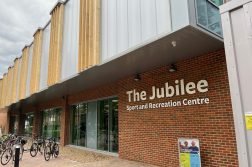Luton Town’s chief executive Gary Sweet has warned that the future of football clubs “at every level” of the English Football League are at serious risk unless there is “a swift and material aid package” from all footballing authorities to deal with the impacts of the enforced postponement brought on by the Covid-19 pandemic.
While the Premier League agreed to send £125 million to the EFL and The Vanarama National League on April 3, this amount has not been enough to provide absolute certainty, considering this aid will only allocate £2 million between all 68 clubs. This proposed ‘rescue package’ has also been unable to prove suffice when considering that clubs from Leeds to Luton are dependent on revenue from gate receipts to keep their clubs on a sound financial footing. As demonstrated by estimates, Leeds United’s scheduled trip to Blackburn Rovers on April 3 would have generated a total of £300,000 for the club alone, with Leeds 7,700 fans purchasing tickets at £40 each. Projections further highlight that Leeds’s Elland Road being left empty for their final five home games would cost the club a total of £3 million in lost revenue. The lack of footballing action will cost the newly promoted Luton Town even more, with estimates predicting that if Kenilworth Road doesn’t open its doors again this season the club will lose between 10% to 15% of their annual revenue. While an early end to the season could potentially send every club below the Premier League into administration, if second division teams are set to seriously suffer from this postponement, then the effect on clubs below them and in the national league more generally, will be colossal when considering their absolute dependence on match-day revenue. As Luton’s Gary Sweet neatly surmises, “Lower-league clubs are vulnerable because they are so reliant upon ticket income and many Championship clubs are vulnerable due to the severe over-stretching of expenditure”.
Whilst it’s an unavoidable reality that Championship teams will have less money to spend in the upcoming transfer windows due to the aforementioned loss of revenue – being forced to rely on youth academy graduates in the short-term – the postponement of all Premier league action will also indirectly hinder the Championship and the leagues below them. This is due to all teams making less revenue during the season and having less money to spend in the transfer window, which makes it less likely for Premier League clubs to gamble on a Championship or League One products and pay the excessive transfer fee. Thereby the chances of any top flight team replicating the £20 million transfer fee paid by West Ham to Hull City for Jarred Bowen next season are very slim. This logic is also applicable to transfers between clubs of the same division. Gone for now are the days when League One teams like Sunderland would be paying £4 million to Wigan for Will Grigg or when then-Championship team, Aston Villa would fork out £12 Million to Bristol City for Jonathan Kodjia. The ‘correction’ of the transfer market triggered by these turbulent times will doubtlessly concern EFL clubs, considering transfer fees provide a welcome and valuable financial addition to the least wealthy in the divisions.
EFL clubs owning commercial contracts with networks such as Sky Sports can however take relief in the reality that they will not be asking for the money back that they have already paid this season. Yet, if the season does resume at a later date such as in mid-June, there are little indications as to whether the following 2020-21 campaign will begin on schedule or not. This makes it likely that Sky Sports could delay their first commercial-related payments of the new season to clubs, which would prove an additional financial headache. The impact of delayed commercial and sponsorship payments will prove even more concerning for clubs further down the pecking-order, due to the reduced economic activity of local businesses who commonly sponsor lower-league teams. Their likely financial predicament after this pandemic means that they may possibly be unable to pay the agreed sponsorship money to their respective clubs on time. After all, with the mass fur-longing of ‘non-essential’ staff across the country, it is unlikely that ‘Princebuild’ (sponsors of Peterborough FC), or Lykerlor Business Solutions Limited (sponsors of Kings Lynn FC in national league North), will have the financial capacity to run their business while simultaneously honouring their commitments up-front. Tranmere chairman and former FA chief executive Mark Palios remarked that without a strong plan this week, it “will potentially lead to carnage, for clubs players, owners and fans alike”.
With the Premier League meeting to discuss their options today, and UEFA delaying a continental decision until mid-May, EFL clubs will be hoping that the footballing authorities choose to restructure the current flawed financial model of English football. The unregulated wages market has resulted in mega-salaries paid at the very top of the game inflating wages down the divisions, and subsequently has created the current professional pyramid we know today. While the EFL has recently announced a £50 million bailout scheme for the clubs most badly affected by Covid-19, EFL clubs have agreed in conjunction with the PFA that all players will defer 25% of their wages during April, The Coronavirus Job Retention Scheme is paying 80% of EFL wages, and the National League has been put on an early ‘sabbatical’ in an effort to save the poorest clubs in the sport. The possibility of multiple clubs from all divisions simultaneously crashing out of the sport via administration is a realistic possibility for the future. This is in light of the fact that multiple Championship clubs zre operating at a rate where they are spending more than they earn, and are not accumulating sufficient revenue to independently sustain themselves, and are therefore heavily dependent on their owners’ investment to keep the club functioning. One hopes that this enforced break from footballing action will start the long overdue process of making the EFL universally sustainable again.



